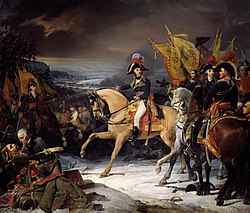Antoine Richepanse (25 March 1770 – 3 September 1802) was a French Army officer and colonial administrator. Richepanse was born in Metz as the son of an officer of the Conti-Dragoon Regiment. When the French Revolution started Richepanse distinguished himself in the early battles of the French Revolutionary War, and by 1794, he had been promoted to général de brigade.

Fighting at Siegburg (June 1796) and Altenkirchen, he was promoted to général de division. In 1797 he fought in the Army of Sambre-et-Meuse under the command of Hoche. Richepanse distinguished himself in the Neuwied, where the Austrians lost 8000 men, 27 cannons and 7 colors. In 1800, he was part of the Army of the Rhine under Moreau, which defeated the Austrians at Hohenlinden in which he played a conspicuous part.
In 1801, Richepanse was appointed by Napoleon as the governor of Guadeloupe. He was given command of a expeditionary force which was dispatched to Guadeloupe to restore French authority in the colony, which was under the de facto control of Black officers. After Richepanse arrived on the island, a battle broke out on 10 May between Richepanse's troops and Black insurgents fearing the possible reintroduction of slavery. Although the insurgents were initially led by veteran officer Magloire Pélage, he quickly switched sides and joined Richepanse, with the position of insurgent leader passing to Louis Delgrès. 3,000 French troops under Richepanse's command and 600 Black soldiers led by Pélage eventually drove Delgrès's rebels into Fort Saint Charles, where they committed mass suicide by detonating the fort's gunpowder stores on 28 May.[1]
Richepanse, having lost 40% of his men either to combat or illness, published a resolution on 17 July which abolished wages for freed plantation slaves and rescinded citizenship for free people of colour. For months afterwards, he carried out a brutal counterinsurgency campaign to root out remaining insurgents. Richepanse's campaign quickly became notorious for its brutality and "even his own lieutenants denounced [it] in their reports". Not long after his arrival in Guadeloupe, Richepanse contracted yellow fever from which he died at Basse-Terre on 3 September 1802. The insurgency against French rule in Guadeloupe continued until 1804, when the remaining insurgents surrendered and were allowed to leave the colony.[2]
wikipedians
This is the start of the #wikipedians chat. #wikipedians — chat for Wikipedians about leveraging the hub to improve its root Wikipedia article.